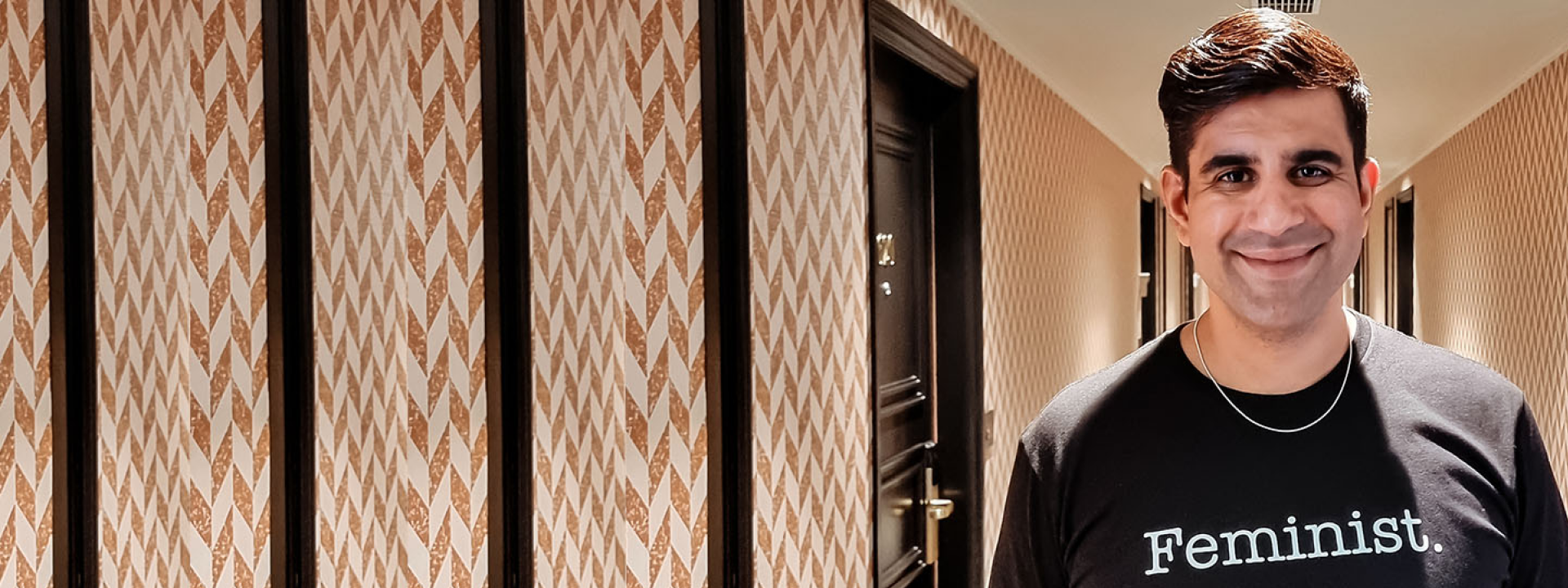The word feminist can send many men into a cold sweat. Often, feminism is maligned in the media as radical, angry women making noise or claiming they don’t need men. Too often, men think feminism is only a women’s issue and that they should avoid any connection with it, positive or negative. Some fear that supporting feminism or calling themselves a feminist would negate their masculinity, while others assume that every feminist that walks the earth hates them. These presumptions couldn’t be further from the truth. Men not only can be feminists, but they should be. Here’s why.

What Being a Feminist Actually Means
First, what is a feminist? The American Heritage Dictionary says, “A person whose beliefs and behavior are based on feminism.” It further goes on to describe feminism as a “belief in or advocacy of women’s social, political, and economic rights, especially with regard to equality of the sexes.”
While this definition might seem broad and simplistic, it’s an accurate interpretation. Whether in the home or at work, giving one gender power over the other is an antiquated practice that has persisted for centuries. Now, however, equality in all sectors is precisely what the movement aims to achieve.
In the news and social media, the feminist movement might seem like it is just getting under way, but the idea is not a new one. In approximately 375 BC, Plato wrote in his book The Republic, “Women possess natural capacities equal to men for governing and defending ancient Greece.”
In the Middle Ages, Italian poet and the first feminist philosopher, Christine de Pisan spoke out against the treatment of women as lesser citizens, thereby denied education and the right to own property. In the 17th century, at the beginning of the Enlightenment, many writers and philosophers advocated for the equal treatment of women, beginning with providing commensurate educational opportunities.

“Indic faiths and traditions also offer pro-feminist frameworks,” says culture journalist and research scholar, Urmi Chanda. “Though scant, there are examples of gender equality in Vedic mythology, Buddhist scriptures, and most definitively in the Sikh tradition. If a handful of tropes of virile warriors like Rama, Parashurama or Hanuman can be used over and over to fuel the notion of patriarchy, feminists should not shy away from using the storytelling resources available to them. Mythical characters such as Satyavati or Radha, historical figures like Mai Bhago, and religious texts such as the Therigatha, can be used to reinforce the idea of feminism and at the cultural level.”
Over the centuries, the idea of feminism has never faded away. As countries and societies developed, industries began, and wars necessitated that women begin working outside the home, the idea of women’s equality moved more prominently into the spotlight. And over time, the push for equality has developed and evolved to include more and more groups within its purview.
Feminism Is Not Just Women’s Work
Cultural ideals, biases, and conventions exert a great deal of influence on how men perceive women. The idea of traditional roles—women being homemakers and primary caregivers and men being breadwinners—endures, and research shows that women still shoulder the majority of household responsibilities, including housekeeping, cooking, and child-rearing.
These presumptions and roles are actually harmful to both women and men. In some countries where greater strides have been made in equalizing men’s and women’s roles, researchers have found that men who participate more in the running of the home experience better well-being. In such cases, depression was less prevalent among both the women and the men. The benefits don’t stop there, as the study’s author noted: “The level of men’s participation at home has an effect on society as a whole.”
One could broaden that assertion to include the positive feelings their actions inspire, contributing to a better world overall.

Gender Equality Improves Men’s Lives, Too
Other cultural elements central to the understanding of feminism are male privilege and patriarchy. Male privilege seems to have dominated society for as long as the topic of feminism has existed. Our history books are filled with stories of men who broke new ground or built empires and in a certain sense they illustrate the lack of relative obstacles men faced. The same history books often portrayed women as models of sacrifice or altruism only.
Although the term patriarchy initially referred to the structure of a family unit, now it is interpreted as “old white men” controlling everyone’s lives. Today, the family unit takes many forms other than the once traditional one with a man as head of the household. Over time, the word patriarchy has evolved to mean a “system of social structures and practices in which men dominate, oppress, and exploit women.” Obviously, this gives women and those identifying as feminists a common enemy and rallying point. No wonder these terms have become triggers for contention and argument, rather than topics for cooperative discussion.
“However, the term ‘feminist’ itself is also not perfect, and is seen as problematic by many,” adds Chanda. “The central premise of equality is lost on many, as the word bears some blemish of being sexist. If seen in the same vein as the words ‘racist’, ‘ableist’, or ‘classist’, it connotes a superiority of the feminine, and thereby negates the proposition of equality. This is probably why people seem far more willing to call themselves ‘humanists’ or ‘egalitarians’ rather than feminists. Feminism is a complex, many-layered concept, and I feel, the ask of gender justice, which is foundational to feminism, is one expectation too many. For a people seeped in patriarchal values, the term ‘feminist’ naturally evokes strong reactions. Perhaps a small course correction in the movement’s vocabulary is the key to some big attitudinal changes, because feminism isn’t only for women and patriarchy affects men too.”
Patriarchy has adversely affected men as well by putting them into boxes and creating an expectation that they be a certain way, leading both in the family and in society. This expectation can be detrimental to young men’s mental and social well-being and should therefore be a focus in the quest for true equality.
How Men Can Make a Difference as Feminists
If boldly calling oneself a feminist is a bit too daunting, men can at least agree that gender equality is critical to a healthy society and act towards achieving that. Gender equality benefits both men and women; as has been clearly proven above.
Here are some initial ways to discuss and promote feminism:
- Look around. Once you observe for yourself the beliefs and biases that hold back women and the feminist movement, you will better understand how women feel when they are stereotyped, or encounter pay disparity and other forms of discrimination.
- Speak up. Whenever you witness a discussion devolving into a feminism slam session, whether that be in your inner circle or locker room, take the opportunity to clarify to others what being a feminist really means. Prevent the perpetuation of feminists as angry man-haters by encouraging conversations that normalize the topic and promote equality, regardless of one’s gender or role. Work to educate others that being a feminist has nothing to do with being anti-men and everything to do with promoting equality.
- Be an influencer. Openly claim about being a feminist. Teach friends and colleagues that feminism is not just for women. Being a proactive member of the movement is one of the most masculine things you can do. You are advocating for women, and all genders, striving to make the world a better place for all.
- Be aware of the benefits. Achieving gender equality would mean that men could be just as free from traditional roles and expectations as women would be. Toxic masculinity and patriarchal ideals are ingrained in society, creating pressure on men to behave a certain way. Eliminating those biases would open the door to a greater sense of purpose, well-being, and social activism for everyone.
- Change the paradigm. Examine your own assumptions and sociological patterns to uncover how they might be affecting your personal view of feminism. Read authors such as Mary Wollstonecraft and Bell Hooks, and follow male celebrities on social media who identify as feminists.
- Make room. Actively advocate for diverse voices and pass the spotlight to women if you are in a position of power. You don’t need to speak for women, but simply ensure they are heard by leveraging your male privilege. When more men contribute as feminists to the overall improvement of society and the workplace, the hot-button atmosphere will lessen, replaced by more discussion and enhanced understanding.
- Take action. Whether you speak out against sexism when you see it or volunteer for tasks that are typically delegated to women at your office, taking action shows you are more than just a sympathetic ally. Such efforts help minimize the association of feminism with a specific gender and creates a more collaborative atmosphere

Nelson Mandela said, “The oppressors must be liberated just as surely as the oppressed.” Men, women, and nonbinary individuals have all been held back by the widespread acceptance of binary gender roles, so they must all work together to holistically change things for the better That work begins with shedding divisive labels, undoing historical wrongs, and removing obstacles in the path to achieving one’s full potential. These are certainly goals that anyone can support. Men, why not fall in line behind the women leading the way?



